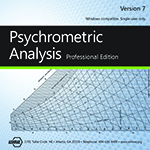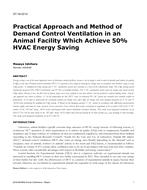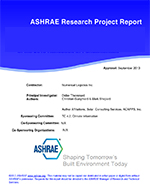It is a known fact that buildings consume nearly 40% of the energy used in the United States. Over the past decade, building professionals have invested a lot of time and effort to develop means and methods to track and reduce the energy consumed by buildings. Such methods include (but are not limited to) energy auditing, energy management, commissioning, retrocommissioningand numerous other energy conservation programs.
This paper discusses methods used to assess the energy performance of the Agricultural Engineering Sciences Building located on the University of Illinois at Urbana-Champaign (UIUC) campus. Built in 1982, the 87,500 ft2 (8127 m2) building had high operating costs as well as occupant thermal comfort issues. In 2008, the building had an average Energy Cost Index (ECI) and Energy Use Intensity (EUI) of $2.95/ ft2/yr ($31.75/m2/yr) and 223 kBtu/ ft2/ yr (703.3 kWh/m2/yr), respectively. Existing building mechanical systems and recent utility bills were analyzed and the building performance wasevaluated through comparisons with benchmarks provided by Commercial Building Energy Consumption Survey (CBECS).
Energy model of the baseline building minimally compliant with ASHRAE 90.1-2004 was developed to project savings by comparison with utility bills. Building occupant surveys were also conducted on the basis of which rooms were selected for monitoring and measurement. The mechanical equipment was then tested for functionality after analysis of measured data toidentify problems in the heating, ventilation & air conditioning (HVAC) system.
Most of the faults detected in the mechanical system were related to operation & maintenance (O&M) and control issues, which were corrected upon detection, resulting in savings of approximately 15%. The retro-commissioning team at UIUC then undertook the project under their wing and worked on the recommendations made through this study. Common O&M and control problems found in educational buildings are also discussed in the paper and the role of continued building O&Min an energy efficient building is realized through this study.
Product Details
- Published:
- 2012
- Number of Pages:
- 8
- File Size:
- 1 file , 1.3 MB
- Product Code(s):
- D-CH-12-C020
- Note:
- This product is unavailable in Russia, Belarus


